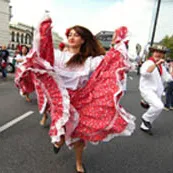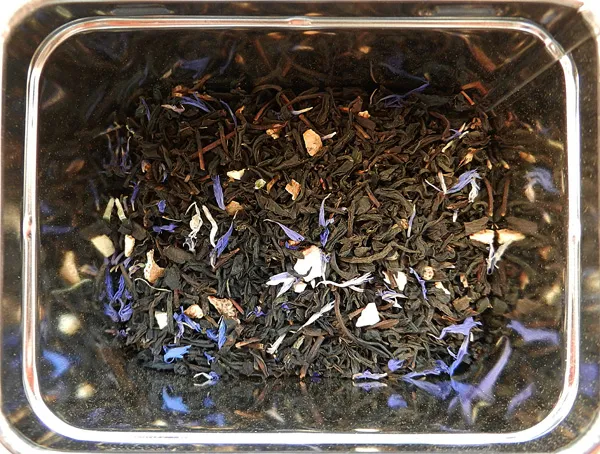Quite a long time ago I noticed that tea is one of the most popular drinks in everyday life of people in Poland, and with the habits comes a distinct culture of tea drinking. It’s difficult for me to decide right now how to call the local tea drinking habits: a separate culture or rather an ignorance because, on one hand they are peculiar, but on the other an access to knowledge about tea is exceptionally poor. Authentic knowledge came to people as a gossip, and this gossip, after being filtrated by another gossipers, transformed into the remains of knowledge mixed with personal experience, which among others led to the formation of a specific path of tea. I’m talking about the culture originated from ignorance because in case of Poland the access to knowledge about tea is particularly limited. You can see that two schools of tea dominate in Europe: English and Chinese, and the English school of tea is the most common. Both schools are based on their own nomenclatures and tea classifications, which misleads a beginning tea taster. However, the top priority, no matter which school is more popular, is to spread correct knowledge. Tea is drunk in Poland in the same way as in other European countries. But the problem is the lack of real knowledge about what tea is, how to taste it and admire, how to classify its quality and so on. In consequence, from the lack of knowledge a separate Polish tea drinking culture was born, as a result of personal trials and errors as well as the influence of English school with a little admixture of Russian traditions.
I personally prefer tea to coffee, that’s why I feel pleased when during a visit I hear a host asking: ‘Would you like some tea?’ I was always fascinated how the Polish people managed to programme in their heads offering tea instead of coffee to their guests. In Chinese culture there is a custom of serving tea to guests as a symbol of respect but it’s impossible that it reached so far – to Poland! It turns out that this custom was spread during the People's Republic of Poland. Over the course of history, the Russian upper class used to drink tea much earlier that the Portuguese, Dutch and English. Tea is still one of the most often consumed non-alcoholic drink among Russians. This way of welcoming guests came also to Poland with their preferences in the last century. We should add to it the habits of sweating tea or drinking teas aromatized with flowers or fruits. That’s why it’s not difficult to talk about a separate culture.
More demanding costumers depart from teas packed in bags and search for more refined products in specialised tea shops. At this moments a stumbling block appears because what exactly are we looking for when we go to such shops? Clients often ask vaguely for ‘something good’ or ‘some green tea’ – but what about its specific character – sweet, insipid, intensively aromatised, expensive, cheap, green, red or maybe black? Without specific knowledge about what we want to buy and seeing hundreds unfamiliar tea names in the shop we risk a wrong purchase, which could result in losing interest in tea in the future. Fortunately, tea in Poland is rather cheap and you can buy everything in small quantities and try to find the product that suits you best.
But have anyone thought that tea quality comes with proportional price? In specialized shops at the Polish market you can buy the cheapest tea in standard weight of 50 grams for only 5 zlotys. Such a product is good for a beginning tea taster since he can find his favourite kind of tea but in long term perspective, when taste receptors get trained, the quality offered by tea shops becomes unsatisfying.
Tea available at the market is below any kind of evaluation criteria and shop assistants with no professional background don’t really know what they’re selling. It often happens that they don’t know enough about a product and they make their clients believe that this product is of the best quality. When I’m in specialized shops in Warsaw, I often ask for classical tea, which is the unflavoured one. However, after opening cans with every tea, I detect a smell of lemon. Obviously, a shop assistant shakes his head and denies the facts. We can compare it to giving the newest medical equipment from the USA without a manual translation to a Pakistani doctor– he knows something but not everything, and the rest is up to his personal trails.
I visit different tea shops in Warsaw because I like tea and I want to know how its situation presents in Poland. Unfortunately, I have only found one tea shop that meets my expectations. I was given there some Nepalese tea to taste. I must admit that I forgot its name but it confirmed my opinion that this tea shop is run by professionals. It turns out that there are several tea experts in Poland.
Apart from classical teas, various teas aromatized with flowers and fruits are really popular and so are tea cocktails. There is nothing scandalous about that – wine or coffee may also be mixed with different flavours. Coca-Cola is sold in vanilla and cherry versions (although I never order such combinations with tea). However, I’m irritated by a natural impulse of sweetening tea and a conviction that tea without sugar tastes badly. I’ve never agreed with that until one day I unintentionally drank Dilmah Gold – then I understood why Polish people add sugar to their teas!
As a matter of fact, unsweetened tea available at the Polish market has no flavour qualities of its own. That’s why I approve of adding sugar to tea of second-rate quality. Tea leaves of high quality smell exceptionally beautiful in their final stage of production, they emit an intensive, unique aroma. In this case white sugar or any other additive spoils this aroma and a natural sweetness. Many Chinese restaurant owners in Poland say that they sink into despair when they suggest tea without sugar to their guests who, in spite of suggestions, still stick at sweetening. For this reason Chinese restaurants in Poland don’t intend to serve better quality tea than at present since their clients would spoil its taste anyway.
We can drink tea without sugar. This thesis is confirmed by many of my friends, who at least once tried tea with no sugar which I often bring them from China. They are surprised that it tastes so good and is so aromatic. They clutch their heads and ask ‘Is this really a tea?’ The secret lies in tea leaves and a method of its preparation. Tea is bitter when it’s badly prepared or its quality is low. I’ve seen many people who left tea leaves in water for too long as they were busy with other things, and as a result, they received an unusually bitter brew. This is a mistake because tea leaves should be brewed for an exactly fixed amount of time depending on a type of tea, amount of leaves, capacity of a cup, water temperature – and then immediately separated from the brew to avoid its ‘overbrewing’.
I’ll tell you one more anecdote related to unskilful tea brewing. Not everyone realizes that some tea leaves are exceptionally efficient and they can be brewed for many times. One day at the university I gave tea to my friend – it was served in a plastic glass (I ask the purists for forgiveness but I was in the university building and had no other choice.) The value of the drink in the glass exceeded 100 zlotys. She drank the freshly brewed tea to the last drop and then, with a sophisticated move of her hand, she throw the glass to the bin. My heart was bleeding in pain...
Tea drinking culture in Poland needs some time for its proper popularizing until it finally becomes accepted. I am personally rather a supporter of propagating in Poland the Chinese tea school because its lifestyle perfectly suits the needs of the Polish people. Chinese tea school tenets are friendship, peace, quiet and harmony. Tea in Chinese culture plays a role of a catalyst, it brings friends together and helps to engage in business cooperation, sometimes pushing alcohol to second place. Calmness is necessary to admire tea, that’s why after each tea session people always feel relaxed and thanks to its stimulating factors they are full of new ideas. In confrontation with more and more stressful times, it is the best relaxation method around the family table, when we go out with a group of friends or during business negotiations.
Anthony Chiu
Translated by: Iwona Białek








